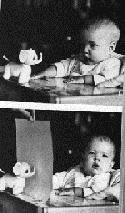
The sensorimotor stage is the first of the four stages Piaget uses to definecognitive development. Piaget designated the first two years of an infants lifeas the sensorimotor stage.
During this period, infants are busy discovering relationships betweentheir bodies and the environment. Researchers have discovered that infants haverelatively well developed sensory abilities. The child relies on seeing,touching, sucking, feeling, and using their senses to learn things aboutthemselves and the environment. Piaget calls this the sensorimotor stagebecause the early manifestations of intelligence appear from sensory perceptionsand motor activities.
Through countless informal experiments, infants develop the concept ofseperate selves, that is, the infant realizes that the external world is not anextension of themselves.
Infants realize that an object can be moved by a hand (concept ofcausality), and develop notions of displacement and events. An importantdiscovery during the latter part of the sensorimotor stage is the concept of "objectpermanence".

Object permanence is the awareness that an object continues to existeven when it is not in view. In young infants, when a toy is covered by a pieceof paper, the infant immediately stops and appears to lose interest in the toy(see figure above).This child has not yet mastered the concept of objectpermanence. In older infants, when a toy is covered the child will activelysearch for the object, realizing that the object continues to exist.
After a child has mastered the concept of object permanence, the emergenceof "directed groping" begins to take place. With directedgroping, the child begins to perform motor experiments in order to see what willhappen. During directed groping, a child will vary his movements to observe howthe results will differ. The child learns to use new means to achieve an end. The child discovers he can pull objects toward himself with the aid of a stickor string, or tilt objects to get them through the bars of his playpen.

THE PREOPERATIONAL STAGE
The preoperational stage occurs from 2 to 6 years of age, and is the secondstage in Piaget's stages of cognitive development. Throughout most of thepreoperational stage, a child's thinking is self-centered, or egocentric. According to Piaget, during the preoperational stage a child has difficultyunderstanding life from any other perspective than his own. In this stage, thechild is very me, myself, and I oriented.
Egocentrism is very apparent in the relationship between two preschoolchildren. Imagine two children are playing right next to each other, oneplaying with a coloring book and the other with a doll. They are talking toeach other in sequence, but each child is completely oblivious to what the otheris saying.
Julie: "I love my dolly, her name is Tina"
Carol: "I'm going to color the sun yellow"
Julie: "She has long, curly hair like my auntie"
Carol: "Maybe I'll color the trees yellow, too"
Julie: "I wonder what Tina's eyes are made of?"
Carol: "I lost my orange crayon"
Julie: " I know her eyes are made of glass."
These type of exchanges are called "collective monologues". Thistype of monolouge demonstrates the egocentrism of children's thinking in thisstage.
Egocentrism of the young child leads them to believe that everyone thinks asthey do, and that the whole world shares their feelings and desires. This senseof oneness with the world leads to the child's assumptions of magic omnipotence. Not only is the world created for them, they can control it. This leads to thechild believing that nature is alive, and controllable. This is a concept ofegocentrism known as "animism", the most characteristic of egocentricthought.
Closely related to animism is artificialism, or the idea that naturalphenomena are created by human beings. Such as the sun is created by a man witha match. "Realism" is the child's notion that their own perspectiveis objective and absolute. The child thinks from one perspective and regardsthis reality as absolute. Names, for example, are real to the child. The childcan't realize that names are only verbal labels, or conceive the idea that theycould have been given a different name.
In the pre-operational stage, the child begins to develop the use ofsymbols(but can not manipulate them), and the child is able to use language andwords to represent things not visible. Also, the pre-operational child beginsto master conservation problems.. Although the child is still unable to thinkin a truely logical fashion, the child may begin to treat objects as part of agroup.The pre-operational child may have difficulty with classification.
In the Latter part of the preoperational stage, the child begins to have anunderstanding between reality and fantasy. The child also begins to understandsex roles in society.